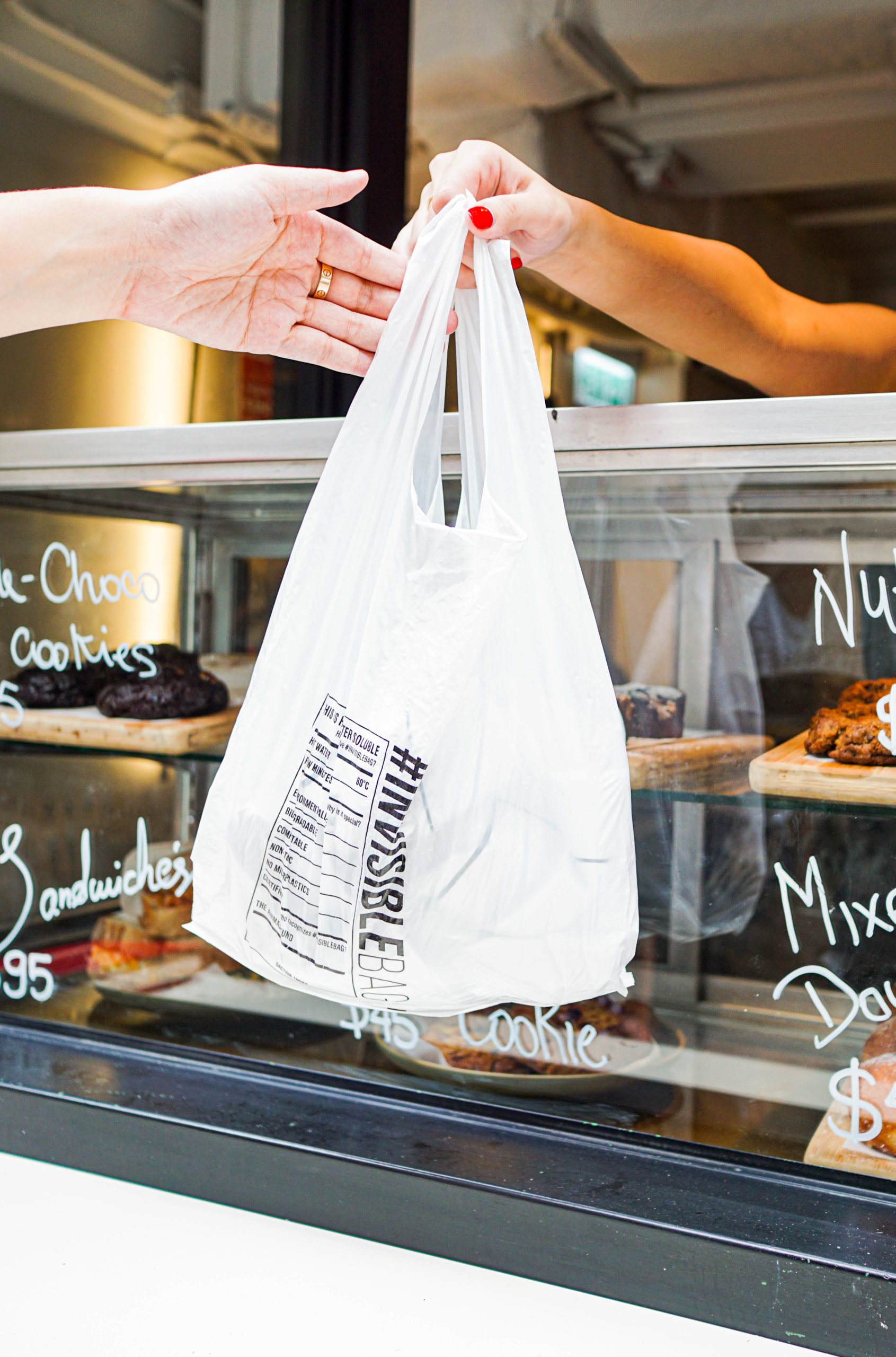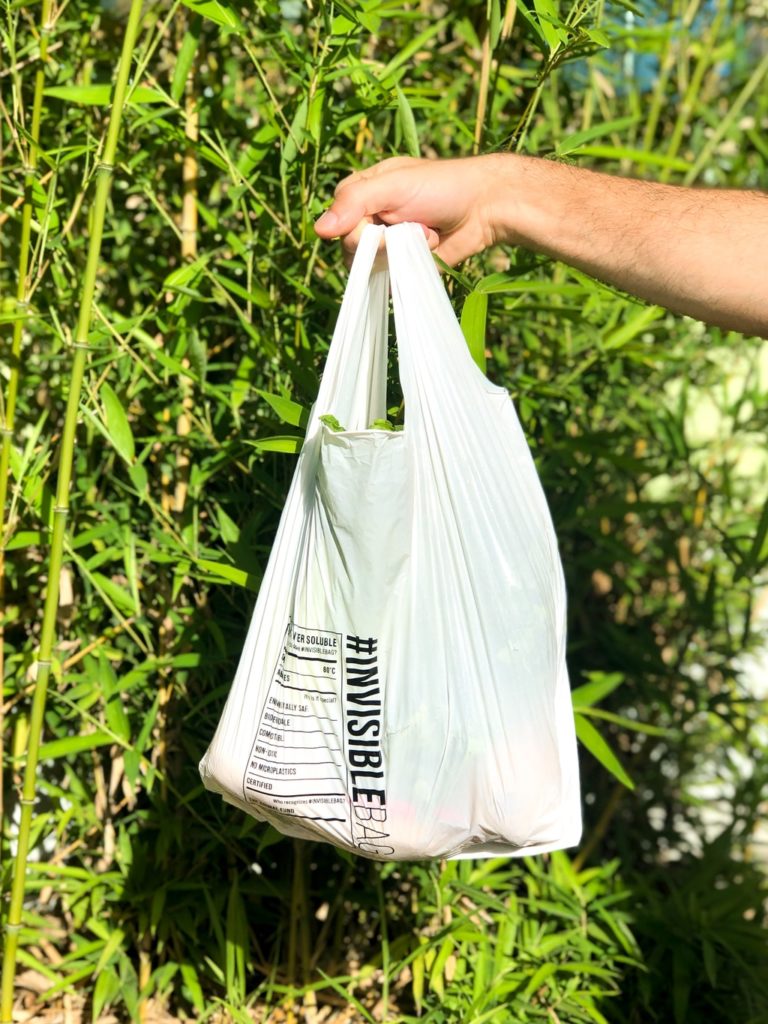While trail running in 2018, Devana Ng and Flavien Chaussegros were shocked at how much waste they found in the otherwise pristine landscape. While collecting the trash they came across, the husband and wife team started talking about how they could disrupt the packaging industry to reduce our reliance on plastic. Thus, Distinctive Action was born. The Hong Kong-based startup has created a bag that dissolves completely in water and is also biodegradable, non-toxic, compostable and leaves no microplastics. Earth.Org spoke to co-founder Devana Ng to talk about how they hope the #INVISIBLEBAG will change the plastic packaging industry and replace conventional plastics.
—
EO: What Inspired You to Start Distinctive Action?
Devana: After seeing the amount of trash in Hong Kong, we decided to get to the source of plastic waste. So we started doing research and in 2019, we travelled to different countries to source materials for water soluble plastic packaging. We are not anti-plastic and we know that we can’t totally avoid plastic packaging but we can be more aware of our consumption of it.
We know that we’re not the first company to release eco-friendly bags, but what sets us apart is that our bags are vibrantly branded. We don’t position ourselves as a supplier- we want to make it easily accessible to the general public, which is why we offer our bags in packs of 200.
EO: What is the #INVISIBLEBAG Made Of, How Easy is it to Source and Can it Be Made Available on a Large Scale?
Devana: #INVISIBLEBAG is made of a biodegradable combination of Polyvinyl Alcohol (PVA), as well as plant-based starch, glycerin and water. It is completely water-soluble, compostable, non-toxic, marine and wildlife safe, and leaves no microplastics. The bag behaves like conventional plastic but dissolves in water at 70°C and above, If left unintentionally, it will dissolve in cold temperatures but at a slower rate. In the marine environment, the #INVISIBLEBAG will degrade up to 75% within 72 days and will fully biodegrade in less than a year.
PVA was founded by two German scientists Hermann and Haehnel in 1924 by hydrolyzing polyvinyl acetate in ethanol with potassium hydroxide. It is a water-soluble synthetic resin that was first industrially produced in Japan and is used as an ingredient in vinylon synthetic fibers. It can be used to coat capsules in medicine, as well as in laundry and detergent packets, and agricultural films. A company in Japan is even using it to create garments with.
Not many countries can source PVA, and it is mostly Japan and Taiwan, but also the US. However, it can be made available on a mass scale, which makes the possibilities for water soluble packaging endless. We also hope that once the technology becomes more widely available, it will be cheaper to produce, and therefore cheaper for the consumer.
The bag was tested for Estrogen Equivalent (EEQ) by biotech lab testing corporation Vitartgent and is considered to be completely safe for humans and wildlife, both marine and terrestrial.
The #INVISIBLEBAG is also ASTM D6400 and EN13432-certified compostable and the Japan BioPlastics Association has proved that it is biodegradable, which means in the natural environment, the product will be broken down by the action of microorganisms, ultimately becoming carbon dioxide and water.
The carbon content of PVA is about half that of conventional plastic. While the afterlife impact of these conventional plastics will remain for years, #INVISIBLEBAG takes months to return to nature with no harm.
You might also like: How 3D-Printed Tiles Can Help Restore Hong Kong’s Corals

EO: What Has the Consumer Reaction Been Like?
Devana: Consumer awareness about plastic waste is definitely shifting. More brands are incorporating green elements into their models and it’s becoming something that they can’t avoid in any case, because there’s a demand in the market for more sustainable and eco-friendly products.
What sets Distinctive Action apart from other similar companies is our branding on the bags. It was important to us to do this as we want to make them stand out more and market these products as eco-friendly but with an attitude. We want consumers to engage with the bags and share it on their social media, as they do now, which fosters a collaborative landscape- we hope that we can inspire others to make changes because only together can we change the world.
EO: How Has Distinctive Action Struggled With the Onset of COVID-19?
Devana: It has been difficult to justify the cost of the bags to restaurants during these times. The #INVISIBLEBAG is more expensive than conventional plastics, but we cannot make this comparison, because plastic is so cheap to produce. As more people start using alternative materials like PVA, it will become cheaper to produce.
We have some restaurant partners: YEARS in Sham Shui Po is using #INVISIBLEBAG and we have an upcoming partnership with La Lune, where customers can get mooncakes in either an #INVISIBLEBAG crossover with La Lune or paper bag.
We are very excited for these upcoming projects. While we want to sell bags and make money, of course, we want to create awareness and influence people to shift their behaviour and become more conscious of their plastic consumption.
EO: What is Distinctive Action’s Long-Term Vision?
Devana: Right now, we are working on research and development to develop new materials that can replace plastic food packaging. We are working with engineers to develop plastic-free materials that can still act as a good barrier against oxygen and bacteria for frozen food and food and beverage containers. This is an ongoing process, and won’t be something that we complete in 6 months. We want to be the leader of alternative packaging solutions, so we need to put a lot of time and effort into it.
Looking outward, we want to work with brands and people that have the same mindset as Distinctive Action or influence them to adopt the same mindset and live more sustainably. Similarly, we want to use our position to help the community we operate in. We’ve donated 200 litres of sanitisers to various charities, including Feeding Hong Kong and Dialogue Experience for the Disabled.
—
The pandemic has seen more widespread use of single-use items as people have been forced to get takeaway food instead of dining at restaurants. This comes at a time when plastic waste is skyrocketing globally. A study found that even if we reduced our plastic waste by 80%, we will still be faced with 710 million tons of plastic by 2040.
This dire prediction makes companies working to reduce plastic waste- like Distinctive Action- all the more important.
Find out more about Distinctive Action and the products they offer at https://www.daction.today/.

















